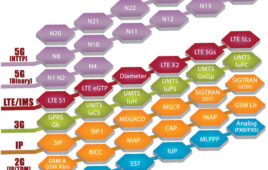The U.S. wireless market received much attention in 2017 between an upsurge of M&A activity, an abrupt race to unlimited data plans and the reversal of net neutrality regulation. Some of the most interesting markets for wireless innovation, however, are outside our borders in emerging markets such as Latin America, Southeast Asia and Africa. As the demand for mobile content skyrockets, these geographies are experiencing the highest rates of mobile data consumption, with expectations of a seven-fold global increase in data traffic by 2021 (according to the 2016 Cisco Visual Networking Index).
The growing dependency on mobile data to access the internet in emerging economies shows no signs of abating; however, that access is often restricted because data costs are prohibitively expensive relative to regional monthly income. Innovation that accounts for consumer budgets, needs and wants will be required to meet market demand and concurrently fuel carrier growth. In 2018, the mobile data plan will be complemented with new business models as the global wireless industry shifts to accommodate consumers with a more content-centric landscape, both benefiting the consumer and providing extensive market opportunities for industry stakeholders such as operators and content providers.
Here are three nascent models that will become commonplace in emerging economies in 2018:
App-Level Access Plans
As in developed economies, content consumption in emerging markets is growing at an extraordinary rate with demand weighted toward audio, video and higher-quality experiences. Moreover, mobile often serves as the only point of internet access for many people in these economies. We are in the midst of a global shift from data plans to a more content-centric landscape, and 2018 will see app-level content offers take root in mobile-first emerging economies.
By providing unlimited access to mobile content, consumers can supplement mobile data plans with more personalized (and affordable) content plans. The trend towards mobile content-centric models will be spearheaded by social, lifestyle and gaming applications that couple content with unlimited access.
Sponsored Access
There was broad-scale experimentation in 2017 with sponsored access models, including sponsored data and zero-rating. By shifting the burden of cost from the consumer to the sponsor – wherein someone other than the consumer, such as publishers, brands, advertisers or the carrier pays for access on behalf of the consumer – both the sponsor and consumer can benefit. The consumer can access content they already love or want to explore without paying the high data tariff, and sponsors can engage with and acquire users more cost-efficiently. These models are particularly germane to emerging markets where data costs are expensive relative to regional incomes and where consumers remain friendly to earning free access by trading their time and engagement for advertising.
Sponsored access also serves as a way for brands and content companies to connect with audiences that have been historically out of reach. Sponsored access models will continue to evolve in 2018 to meet the needs and wants of the market – providing more engagement opportunities for both the consumer and the mobile ecosystem of brands, advertisers, app developers and publishers.
Content Access Plans
Due to prohibitively high costs of data plans in emerging markets, it is unlikely that the one-size-fits-all unlimited plans popularized in the U.S. will make their way to emerging economies anytime soon. However, more affordable content plans that provide unlimited access to specific apps and groups of apps have the opportunity to fill a major void. Broad availability of these plans will be driven by carriers that will capitalize on the content revolution with pricing that accommodates consumer budgets for access that benefits their business models.
In 2018, content plans that provide access to third-party supported, licensed or carrier-owned content will become more and more prevalent in emerging economies. For example, offerings such as those from SmartCom, a mobile operator in the Philippines, provide unlimited data for Facebook. These new models deliver revenue growth and market differentiation to the carrier while delivering value to the consumer, and increased usage for the app publisher and content provider.
Gary Greenbaum is the co-founder and CEO of Syntonic.




